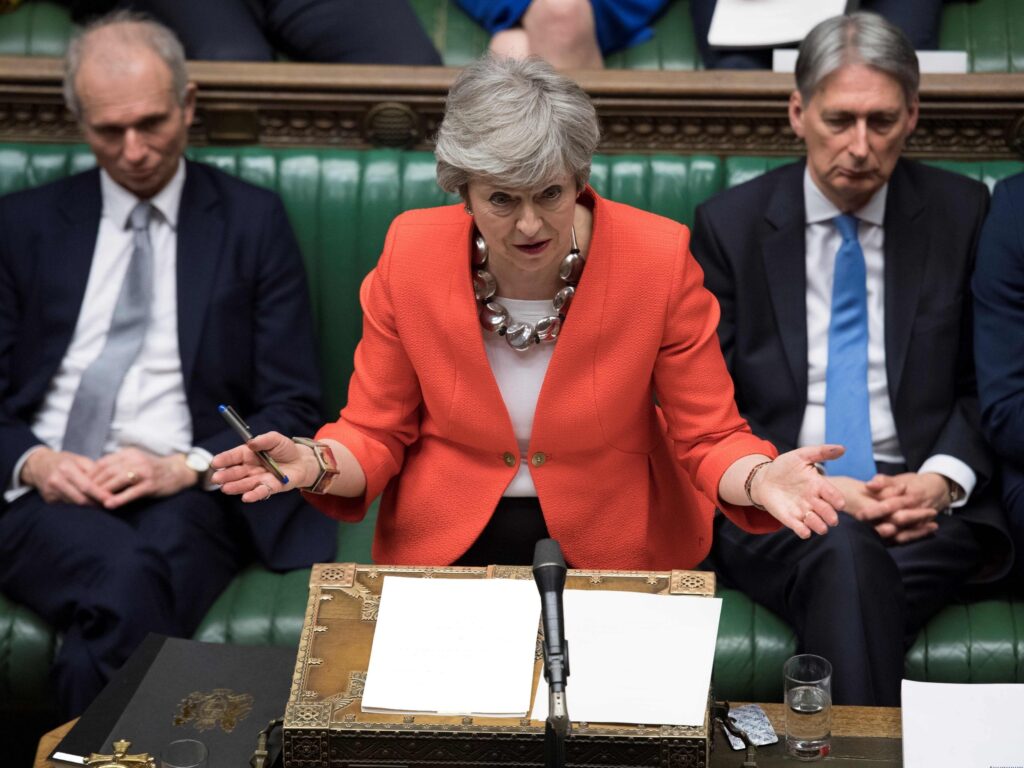Theresa May’s ‘deal’ to confirm the UK’s departure from the EU has been defeated again by a large majority (149 votes).
The UK Parliament will now vote March 13th on whether the UK should leave without a deal. If Parliament rejects leaving without a deal, which at this stage would be expected, then a further vote on March 14th will take place on extending Article 50 to delay the Brexit date of 29 March.
Update March 13: “No Brexit deal” vote did not pass.
Update March 14: British lawmakers voted overwhelmingly to seek a delay in exit from the European Union.
Brexit: Where are we now?
- The UK Prime Minister’s ‘deal’ has again been heavily defeated.
- Theresa May flew to Strasbourg last night to attempt one last-ditch negotiation with the EU to remedy the so-called legal ‘backstop’. This is the legal and practical arrangement that would come into force if the UK and EU could not agree a future trade deal and to prevent a hard border between the UK and the Republic of Ireland in Northern Ireland. Many UK MPs have been concerned that this arrangement would keep the UK indefinitely in the EU Customs Union and that it (the UK) would not be able to leave of its own volition.
- This morning, the Government’s own chief lawyer and Attorney General, Geoffrey Cox, said in his view that the new EU reassurances were still not good enough to resolve this.
- As a result, key groups of MPs that would have been needed to vote for the deal refused to vote for it, including the Government’s own partners, the DUP, and large swathes of Remain and Brexit-backing MPs in its own party
Brexit: What will happen next?
- The UK is still due, legally, to leave the EU on 29 March with or without an exit deal in place.
- As a reminder, if a deal was voted through (and accepted by the EU Parliament), the UK and EU would enter a transition phase where the UK remains a member of the EU until 31 December 2020, and while a new UK / EU Free Trade Arrangement (FTA) was negotiated.
- MPs will now vote for Parliament to give a view on whether it will:
-
- 1) See the UK leave without a deal. Its unlikely a majority of MPs would vote for this.
- 2) extend Article 50 for a short period (likely a few months) to allow the UK Government to try and negotiate another deal or to look at other options
- The Government’s next likely stated direction will be made by the end of the week, after the votes tomorrow and Thursday.
Immediate chances for a 2nd Referendum or General Election
- Although the Labour Party are now officially supportive of a 2nd Referendum (on a question that is still not determined, and with a leadership that is still highly sceptical of it), there is not yet a clear majority in this Parliament for one.
- For a General Election to occur, 2/3s of MPs would need to vote for a motion laid for one, and it’s not clear that an election at this stage would suit either the Conservative or the Labour Party. It could however increasingly be seen as the only way to try and resolve a dead-locked Parliament.
Brexit: The political realities and context
- This is a chiefly ‘remain’ supporting Parliament with around 500 MPs having been remain supporters (and albeit of one where many of those MPs have said they ‘respect’ the result of the 2016 Referendum).
- The Conservative Party ‘lost’ the 2017 General Election having squandered its majority, and is now propped up as a minority government by Norther Ireland’s most hard-line Unionist party, the DUP. The Conservative Party is highly split on Brexit, and is now almost operating as two parties, with the deeply Euro-sceptic ERG (European Research Group), operating as a party within the Party.
- The Labour Party, despite having done better in the 2017 election than many expected, has failed to generate any sort of decisive lead in the UK opinion polls since that election. This is also despite the Government having been seen to have so badly handled Brexit. Its leadership has previously been hostile to the prospect of a 2nd referendum) and the EU in general) which puts it at odds with its own membership. The Leadership has begrudgingly moved to support a 2nd Referendum, but with little vocation. Many of its MPs, even remain supporting ones, represent constituencies in the North of England which voted heavily for Brexit. Its leadership is also riven by a scandal involving claims of deep anti-Semitism that has led to several prominent MPs leaving it (also for other reasons including its handling of Brexit). Although it has previously focused on trying to force a fresh election, many do not feel it would do well in one, or that it is ready to fight it.
- Those MPs that left Labour (8 in total) have formed The Independent Group (TIG), with a small number of remain-supporting former Conservative MPs (3). It is not yet a fully-fledged campaigning political party, but is now seeking to become one.
- The third largest group of MPs in Parliament is the Scottish National Party (SNP), which chiefly exists to create an independent Scotland. Although Scotland voted in favour of remain, it is not yet clear there is enough support there for another referendum to overturn the 2015 Independence Vote they lost. Its also far from clear the EU would admit an independent Scotland to the EU as this is a very sensitive issue for other large EU countries like Spain (Catalonia Independence).
Get Tantalus Alerts
Receive high-value actionable insights for management and communications professionals. We only send what matters most.


